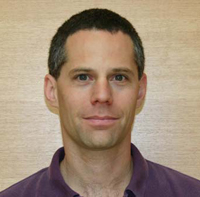 |
Steve Caplan, Ph.D. |
NOTE: This profile is part of a series highlighting the 26 researchers who were named UNMC Distinguished Scientists or New Investigators for 2007. Each of these researchers will be profiled in UNMC Today leading up to a March 20 ceremony to recognize their achievements.
- Name: Steve Caplan, Ph.D.
- Title: Assistant professor of biochemistry and molecular biology
- Joined UNMC: 2003
- Hometown: None, really! I was born in Cleveland, grew up in Winnipeg, Canada, and lived in Israel for 20 years before coming to the United States for post-doctoral studies.
Briefly describe your research in laymen terms, please.
The focus of my research is to enhance our basic understanding of the molecular mechanisms that regulate transport of proteins from one cellular localization to another. This is particularly important, because as the saying goes “Location, Location, Location” is not just important in real estate, but for cellular protein function as well.
What led you to pursue this area of research?
Since hearing a seminar by Dr. J. Michael Bishop as a student years ago, I became convinced that the highest “scientific calling” is to pursue basic research and to better understand the world that we live in from a molecular level. That is not to say that it isn’t also critical to continue to pursue clinical/translational research, but I am a firm believer that ultimately we must understand more of our microscopic universe in order to make major strides towards eradication of certain diseases.
How do you see your research contributing to science?
One of the exciting things about basic research, is that despite the long hours that we spend writing detailed grants that outline all the possibilities and outcomes to be expected, there are always new, exciting, unpredicted and unexpected findings that tend to surface. One has only to recall the range of serendipitous discoveries (penicillin, ‘defensins’, etc., etc.) that have advanced biomedical science so greatly to understand that as long as good science is being done, great discoveries will follow.
Why did you become a scientist?
A career in science, particularly in academia, is an honor and a privilege. It is a wonderful feeling to awake almost every morning and know that each day may bring exciting new findings that I am free to pursue, if I choose. For those of us who have a burning curiosity about our physical/chemical worlds, and for those of us who do not want to do “routine jobs,” but to continue learning on a daily basis, particularly as technology further develops our scientific breadth, this is a wonderful lifestyle.
What is your hope for the next generation of scientists?
I hope that the next generation of scientists will be able to survive current scientific budgetary concerns, and to continue to drive forward the new technologies that are so critical to the advancement of science.
Beyond grant funding, how do you measure success?
I do not see grant funding as an independent measure of success, but rather a very crucial precursor to attaining success. From my perspective the major criteria for success is publishing top quality scientific papers in highly respected peer-reviewed journals. This, too, is a cycle, because the publication of such papers often leads to additional grant funding. Other related measures of success include the development of a dynamic and motivated research group, invitations to present seminars at international meetings and other universities, etc. However, those achievements are all derived from success in the laboratory leading to publications in scientific journals.
What would you tell a student interested in a research career?
The first thing I would say, is that science is not a “job” but a “way of life.” To succeed, a student needs to be very committed. To really excel, it is necessary to become “obsessed,” albeit in a positive way, with one’s research and science. But the benefits for those who do are great. One other note, students need to learn to have a “thick hide.” Experimental systems often take many tries and a long time to successfully launch and researchers need to be able to handle difficult times as well as good times.
Do you have a hero/role model? If so, what do you admire most about them?
I have many “heroes” and role models, including several superb mentors right here at UNMC — Dr. Peggy Wheelock and Dr. Rick MacDonald, just to name a few. However, without a doubt I look up to Charles Darwin as having made the most significant contributions to the biological/biomedical sciences ever. Not only his utter genius, but dogged persistence in promoting scientific truth in the wake of superstition (some of which, unfortunately, remains to this day) renders him my all-time hero.
Tell us about your family and hobbies outside of the lab.
My spouse and co-investigator here in the lab, Dr. Naava Naslavsky, is a key to our laboratory’s success. I see this as a joint endeavor, and this award reflects our partnership together. It’s great to have someone with her professional abilities, as well as a wonderful partner in my life to work with. My daughter Mika, 9, is an avid bookworm and superb chess player. My son Eylon, 6, is a mathematical wizard and also a trophy-winning chess player. We all love to read, travel and hike together.
List three things few people know about you.
- I served as an artillery commander in the Israeli Defense Forces;
- I play competitive chess (as do my children); and
- I took a year off after receiving my undergraduate degree to backpack through South America.